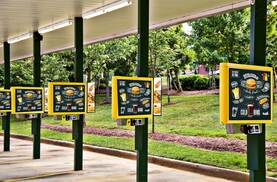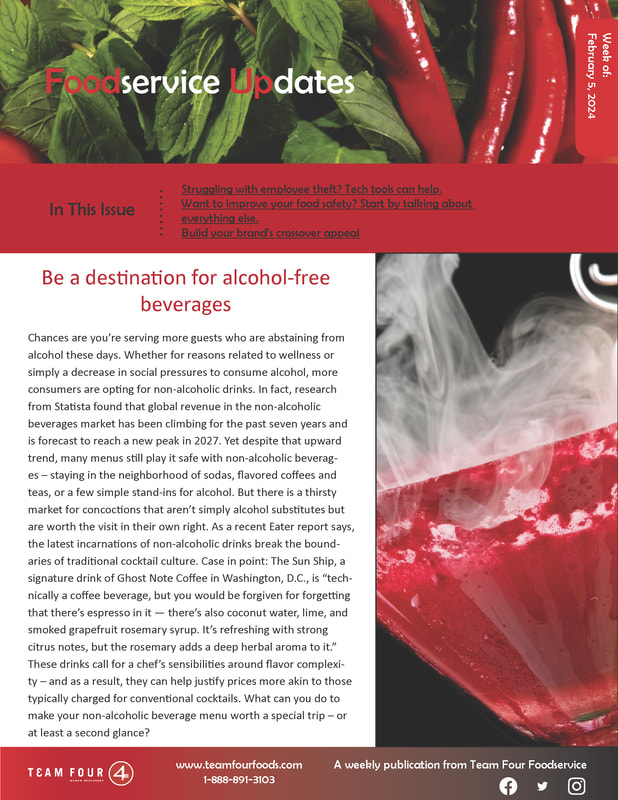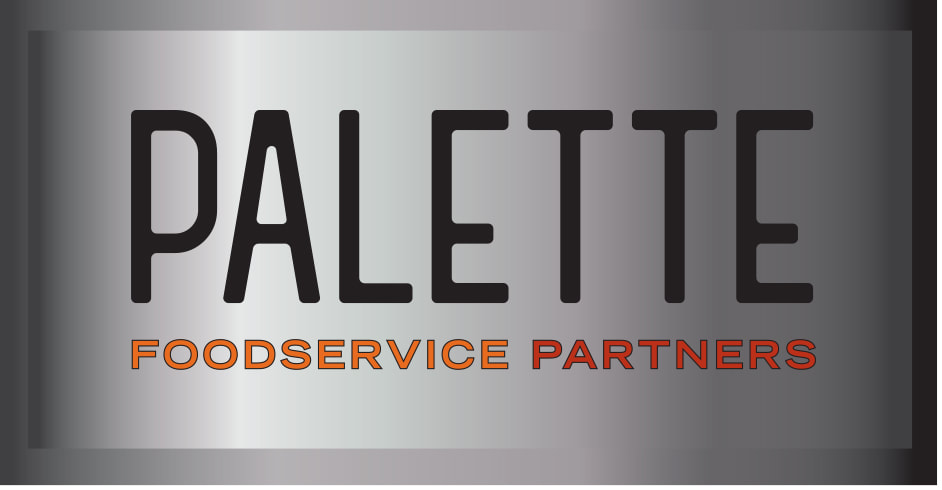 Beyond using digital signage in your restaurant to help drive sales, there are also opportunities to use it to boost communication and engagement with your team. As a QSR Magazine report suggests, you can use it to list a leaderboard of performance metrics on your team to encourage healthy competition -- or even use it as a training tool itself. You can share messages about your values that help engage people in your culture, as well as to recognize the achievements of staff members. Day to day, use it as another vehicle to deliver just-in-time messages to staff to make sure everyone is up to date about key information.  Feeling competitive? A lot of your industry peers are. Recent research from the National Restaurant Association found that nearly half of operators expect competition to be more intense this year than it was last year. Only 7 percent expect it to ease – and that’s in an environment where the majority of operators say there either the same number of restaurants or fewer restaurants than there were in 2019. Your technology stack can help you make sure you’re seizing every opportunity to serve guests well and keep them coming back. You can accomplish this in several ways: Smooth out and speed up your ordering process. Your mobile app can go far in representing the experience of your restaurant. Make it easy for people to view the menu, place orders and make reservations with a minimum of clicks and scrolls. Regular customers should have easy access to previous orders and be prompted with special offers and add-ons that complement their favorite menu items. In-house, consider incorporating tableside ordering and payment to improve order accuracy, expedite service, and ensure your staff can make best use of their time. Depending on your restaurant category, consider using digital menus and signage to update your menu in real time and draw guests to your most profitable items. Finally, your customer data – as well as information you collect about the competitive landscape – can help you better understand how people feel about your menu, keep tabs on your service, and allow you to stay nimble so you’re able to make proactive changes to benefit your business.  As we brace for a potential recession, your digital technology may be your restaurant’s best protection. It can help you identify the snags that may prevent you from operating more efficiently. But in an age when there is so much potential data for a restaurant to collect and analyze, analysis paralysis is common. To make the most of the information you collect, focus on several key metrics: how you can best streamline your labor, track staff performance, identify your best-selling items and other items that aren’t as profitable, and slim down your operating hours so you’re open when you’re most likely to profit. This will help you elevate your more profitable items and identify potential waste that is holding you back – whether that is in the form of a low-profit entrée, a low-traffic period that is difficult to staff, or a server who needs support in upselling orders.  Nearly every aspect of restaurant operations needs to be flexible right now – and your technology is no exception. Having a means to get information to customers in real time can help you make sure people are informed about what’s happening in your restaurant, including changes to anything ranging from your menu to your operating hours. Digital signage can help you by providing a flexible tool to get information out to customers as they need it. You can promote limited-time offers that help get excess menu items out the door faster, or upcoming events at your restaurant. If you’re looking to hire new staff, digital signage can help you get the attention of the people who already support your restaurant and believe in your brand. And speaking of your brand, your digital signage can be used to reinforce your business values and express appreciation for both customers and employees at a challenging time for the industry.  At a time when so many restaurant workers have left the industry, the first impression you make on a candidate matters. According to a recent webinar from the National Restaurant industry entitled “New Thinking for New Challenges - Technology, Workforce and The Restaurant Operator,” the technology you use during initial candidate interactions can help. That’s especially true because the millennial generation, which grew up around technology and is comfortable with it, will comprise 75 percent of the workforce by 2025. The industry experts participating in the podcast suggest you have a strong online presence through your website, then enable candidates to apply for positions via a text or a scan of a QR code. Further, any information you request from a candidate on an online form should then feed into other forms (such as I9, W4 and WOTC tax forms) so you’re not asking for the same information multiple times. Digital restaurant sales still have room to climb. According to new data from market research firm Incisiv, digital sales will comprise 54 percent of all limited-service and quick-service restaurant sales by 2025 – a 70 percent increase over pre-pandemic estimates. Forbes reports that as restaurants look to position themselves to accommodate more digital sales, new partnerships between tech companies and large restaurant brands are focusing on such aspects of the customer journey as using artificial intelligence in marketing, accepting customer orders via social media and messaging platforms, and enabling autonomous driving as a means of making delivery financially feasible.
If you’re struggling to make delivery work, embracing and fine-tuning your curbside pickup service this year could be your best way to reap the benefits of digital orders (like bigger check totals and the ability to retain customer data) while avoiding the disadvantages of third-party delivery. Operators have been making large investments in the digital technology that will make curbside pickup work, according to a Restaurant Dive interview with Jean Chick, principal and U.S. restaurant & food service leader at Deloitte. She said consumers are more apt to go for it if they live within a 10-mile radius of the restaurant because it may end up being faster than waiting for delivery. Curbside offers benefits to both restaurants and customers: It gives a restaurant the ability to control their interaction with a customer and make it a fast, safe, positive, data-rich one. It’s a digital experience, so it is quick, but it is also personal, which can help convert customers into regular visitors. Could you enhance your curbside pickup experience this year?
Last year at this time, having an on-trend menu or holiday promotions may have been priorities for you. Fast-forward a year and restaurant hospitality – and the ethics surrounding it – looks much different. One recent Washington Post article mentioned how diners, in general, are going through a more rigorous decision-making process when it comes to determining if and where they will dine out. Criteria that would have seemed outlandish just a year ago – like a restaurant’s COVID-19 protocols, table-distancing measures, neighbourhood and amount of foot traffic – now speak volumes to consumers about a restaurant’s potential risks (and therefore, the quality of their hospitality). If local restrictions fluctuate in the coming months, how will you consistently communicate safety to your guests and off-premise customers? Continue to promote – via your website, social media and in-store signage – that you are committed to protecting the safety of both your staff and your guests. If guests want to access detailed information about how you’re handling COVID-19, provide details on your website. Post your employee sick leave policy, specific cleaning protocols and schedule – yes, recent research indicates that more consumers want to know these details – and what you are doing to protect the safety of off-premise meals as well. Much like restaurants that have developed a loyal following of customers who have food allergies, restaurants that visibly protect guest safety – not just for show but as a deeply felt value – stand to earn guest loyalty too.
We all know that customer data is becoming increasingly valuable for restaurants as they look to better understand taste preferences, evaluate emerging menu trends, and make decisions around everything from staffing to inventory. But how complete of a picture are you getting from the data you collect in a single customer transaction? And how valuable is that data if a person is often ordering on behalf of others, as might happen in an office setting? As QSR Magazine reports, restaurants could benefit from forming new data partnerships across a number of different areas of a foodservice operation – whether that be with delivery vendors, suppliers, credit card partners or other brands within similar foodservice categories. Are there opportunities for you to collaborate with other businesses across the industry to share and gather insights in a way that still protects consumer privacy?
Eager to drive more sales through your app? Try offering enticing options that are only available to people ordering via that channel. Sweetgreen, which has experienced a 178 percent jolt in digital orders through the course of the pandemic, is among the chains that have recently released collections of online-only dishes based on the favorite food orders of notable chefs and athletes. Even if you don’t have well-known guests to tout, simply creating and promoting dishes (or offers of bonus loyalty points or two-for-one appetizers) that are exclusive to your app can help bolster off-premise sales and safeguard your business for the months ahead.
|
Subscribe to our newsletterArchives
July 2024
Categories
All
|








 RSS Feed
RSS Feed